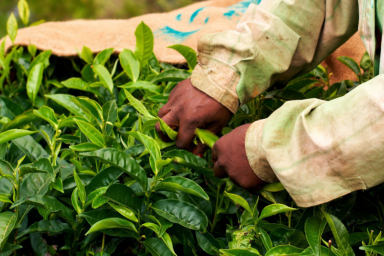Green logistics – strategies for eco-friendly delivery
Making deliveries more sustainable is one step businesses can take to be more eco-friendly.
This guide outlines what to consider when creating a green logistics strategy.
Transportation has a major impact on the environment.
It is the largest contributing sector to the UK’s emissions, accounting for 27% of total emissions in 2019 (.PDF, 1.9 MB)(Opens in new window).
The continued rise in parcel deliveries is responsible for much of that impact.
Driven by a huge increase in e-commerce, that number looks set to grow.
The World Economic Forum (WEF) predicted that demand for urban last-mile delivery will grow by 78% by 2030, leading to 36% more delivery vehicles in the world’s top 100 cities.
But whilst such growth is good for the online economy, it’s not such good news for the planet.
According to WEF, without invention, there will be a 30% increase in carbon emissions.
Driven by regulatory demands and the UK’s target of becoming net zero by 2050, the pressure is on businesses to act when it comes to making deliveries more sustainable.
Customers are a factor too. They are increasingly conscious of their environmental impact and are seeking brands that fit their values.
How to create and implement an eco-friendly delivery strategy
Making your deliveries more eco-friendly could be one element of your business’ overall sustainability strategy and action plan.
Before setting targets for improvements, it’s important to assess where you are now.
There are various tools you can use to determine the carbon footprint of your deliveries, including:
You could also consult stakeholders, such as suppliers, investors and customers, for feedback on the sustainability of your deliveries.
Once you’ve worked out how you are currently performing, consider setting short and long-term goals to improve sustainability.
It is recommended that they are science-based targets aligned with limiting global temperature rise to 1.5°C above pre-industrial levels and fit with the SME Climate Commitment - calling on businesses to halve emissions before 2030 and achieve net zero emissions before 2050.
To meet these goals, you could create an action plan for how your business outlining timeframes, responsibilities, and resources.
You could even publish your targets on your website and elsewhere to communicate your commitment to stakeholders and others.
Continually measuring your progress against targets can help keep you on track with reducing carbon emissions as part of your environmental, social and governance (ESG) activities.
What to include in your eco-friendly delivery strategy
Eco-friendly vehicles and fuel
Using electric and other zero-emission delivery vehicles can help to slash your carbon footprint.
For small local deliveries, e-cargo bikes and electric scooters are an option with the UK Government setting up e-scooter trials in regions across England.
If you use your own delivery vans, the Energy Savings Trust recommends reviewing carrying capacity and payload requirements when replacing vans and downsizing if possible to cut fuel consumption.
You could also ensure your drivers are trained in how to drive sustainably (.PDF, 3.4 MB)(Opens in new window).
Optimise delivery routes
The longer the route, the more fuel is required and the bigger the carbon footprint.
More efficient planning of deliveries can reduce mileage, environmental impact, and fuel costs.
Route optimisation software helps businesses plan multi-stop deliveries by calculating the shortest journey and the most efficient order.
It can also enhance customer service by providing accurate updates on when the package will arrive.
Green delivery slots
Delivery businesses can consider providing customers the option to select sustainable delivery slots.
This involves grouping together orders from the same area, which is more fuel-efficient and helps to lower your carbon footprint.
You can Incentivise customers to book green slots by making them free or cheaper than other times.
Click and collect
By offering click and collect you can allow customers to pick up deliveries in your store or another location, meaning you can consolidate deliveries into one drop off point and reduce fuel mileage.
If you have your own retail location, it can boost sales too.
Barclaycard research found 85% of consumers buy additional items when using click and collect.
Sustainable packaging
An estimated five million tonnes of plastic is used in the UK every year, nearly half of which is packaging.
You could ensure your delivery packaging is as sustainable as possible.
Options include compostable envelopes, recyclable cardboard boxes and biodegradable labels.
Not only is it better for the environment, but you might reduce your tax bill too.
The Plastic Packaging Tax applies to businesses that have manufactured or imported ten or more tonnes of finished plastic packaging components within the last 12 months.
Efficient delivery packing
Inefficient packing of parcels out for delivery can also result in more vehicles than necessary.
Steps to improve efficiency include:
- making sure packaging is no larger than is needed
- fitting more items in a box
- grouping orders by the same customers together
- keeping packaging fillers to a minimum.
Disclaimer: We make reasonable efforts to keep the content of this article up to date, but we do not guarantee or warrant (implied or otherwise) that it is current, accurate or complete. This article is intended for general information purposes only and does not constitute advice of any kind, including legal, financial, tax, or other professional advice. You should always seek professional or specialist advice or support before doing anything on the basis of the content of this article.
Neither British Business Bank plc nor any of its subsidiaries are liable for any loss or damage (foreseeable or not) that may come from relying on this article, whether as result of our negligence, breach of contract or otherwise. “Loss” includes (but is not limited to) any direct, indirect, or consequential loss, loss of income, revenue, benefits, profits, opportunity, anticipated savings, or data. We do not exclude liability for any liability which cannot be excluded or limited under English law.
Tags related to this content:
Green Decoder
Featuring a glossary of sustainable terms curated in partnership with the Nottingham Business School, Nottingham Trent University, our green decoder is helping smaller businesses decipher the terminology surrounding decarbonisation.



